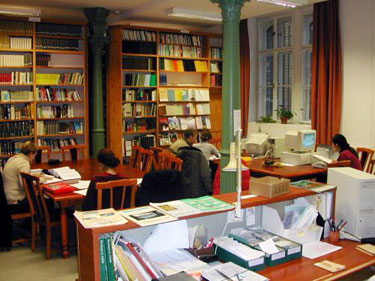INSTITUTE OF EAST ASIAN STUDIES LIBRARY
Address: Múzeum krt. 6-8, lower ground floor 126.
E-mail: far_eastern_library@btk.elte.hu
Webpage: konyvtar.elte.hu/hu/node/225
Librarian: Kornélia MAJOR
Opening hours:
Monday: 11 am – 3 pm
Tuesday – Thursday: 9 am – 3 pm
Friday: closed
Introduction

The Library of the Institute of East Asian Studies (previously the East Asian Collection of the Institute of Oriental Studies) was moved to its current location in 2001: the lower ground- floor room of the Múzeum körút Campus of the Faculty of Humanities. Here it was possible to set up a reading room with a capacity of 24 readers besides the storeroom, where readers are provided with several computers and WiFi connection as well. In 2008 a mobile shelving system was built in the storeroom.
As the Department of Mongolian and Inner Asian Studies was also integrated into the Institute of East Asian Studies, which was established in 2008, there are currently five main collections within the Library: Chinese, Japanese, Korean (ca. 1200 volumes), Southeast Asian (ca. 800 volumes) and Inner Asian (ca. 10,000 volumes). The latter collection can be found in a separate room in building 4/B of the Campus. The whole collection contains ca. 40,000 volumes, the number of available periodicals is forty-four.
History
During World War II almost the entire collection of the Institute of East Asian Studies (at that time called the Institute of East Asian Studies) was destroyed, so the collection had to be re-established virtually from the beginning. The declaration of the People’s Republic of China and the growing improvement in Chinese-Hungarian relations had a significant impact on this process as the People’s Republic of China contributed with substantial book donations to the enlargement of the collection. Our Library is currently taking part in the Shanghai Library’s book donation program called “Window on Shanghai” and has won the Formosan Chiang Ching-kuo Foundation’s “Library Acquisition Grant” several times. The Japanese collection’s substantial enlargement could begin only after diplomatic relations were established in the late 1950s. The Japan Foundation and the Komatsu Chikō Foundation have supported the Library with precious donations since that time. The core of the Korean collection was constituted by the 2-300 volumes donated to the Library by the Democratic People's Republic of Korea in the 1950s and ‘60s. Since the second half of the 1990s the Korea Foundation of South Korea has continuously supported our Library within the framework of its book donation program. The basis of the Southeast Asian collection was the few hundred volumes donated by the Democratic Republic of Vietnam in the 1970s. This was expanded with the donation of Professor János Jelen at the establishment of the Southeast Asian Centre.
Important book legacies are also to be found in the Library: the legacies of Professor Ferenc Tőkei (1930–2000), sinologist, member of the Hungarian Academy of Sciences, László Szegő, sinologist, Ildikó Ecsedy (1938–2004), sinologist and Professor Hideichi Fukuda (1932–2006), as well as the books related to East Asian topics of Béla Éliás, former Beijing reporter of the Hungarian Telegraphic Office (MTI), ca. 7,000 volumes in all.
Borrowing rules
Borrowing is available for professors and students of the Institute, while basic services (reading, information, catalogue usage) are available to the general public (not limited to members of the University). Periodicals cannot be borrowed, and documents placed in the reading room can only be used on-site.
Catalogue
A card-index of the traditional type (alphabetical and thematic) exists for the Chinese and Japanese collections, but the development of this catalogue ceased in 2004. Computerized processing started under the guidance of the ELTE University Library in 1997, then using the HORIZON integrated library system. In 2010 the ALEPH library system was purchased by the University, which also makes it possible to process documents in their original writing system; thus our library became the only one in Hungary where Chinese, Japanese, Korean and Mongolian documents are searchable in transcript as well as in their original writing systems.
Inner Asian Collection
Address: 1088 Budapest, Múzeum krt. 4/B. 233.
Phone: (06)-(1)-410-69-00/2096
The collection can be visited subject to preliminary agreement regarding the time of visit. Materials in the collection: the Mongol and Tibetan collection. A catalogue for the Tibetan collection is already available.

